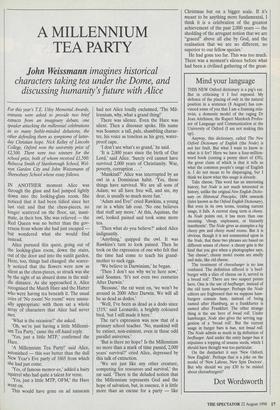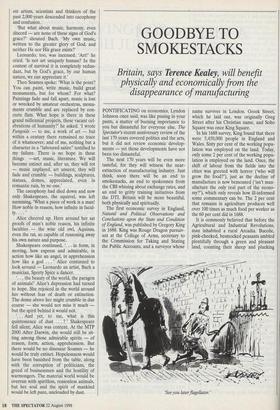A MILLENNIUM TEA PARTY
John Weissmann imagines historical
characters taking tea under the Dome, and discussing humanity's future with Alice
For this year's T.E. Utley Memorial Awards, entrants were asked to provide two brief extracts from an imaginary debate, one speaker attacking the millennial celebrations as so many feeble-minded delusions, the other defending them as symptoms of latter- day Christian hope. Nick Kelley of Lincoln College, Oxford won the university prize of 42,500. There were two winners for the school prize, both of whom received f1,500: Rebecca Smith of Stanborough School, Wel- wyn Garden City and John Weissmann of Shrewsbury School whose essay follows.
IN ANOTHER moment Alice was through the glass and had jumped lightly down into the looking-glass room. She noticed that it had been tidied since her last visit and that the chess-pieces, no longer scattered on the floor, sat, inani- mate, in their box. She was relieved — the Red Queen was no better than the gov- erness from whom she had just escaped but wondered what she would find instead.
Alice pursued this quest, going out of the looking-glass room, down the stairs, out of the door and into the sunlit garden. Here, too, things had changed: she scarce- ly noticed that the flowers were now as silent as the chess-pieces, so struck was she by the sight of an absurd dome in the mid- dle distance. As she approached it, Alice recognised the March Hare and the Hatter who were having tea beneath it. The usual cries of 'No room! No room!' were unusu- ally appropriate: with them sat a whole array of characters that Alice had never met.
`What is the occasion?' she asked.
`Oh, we're just having a little Millenni- um Tea Party,' came the off-hand reply.
`Yes, just a little MTP,' confirmed the Hare.
`A Millennium Tea Party!' said Alice, astonished — this was better than the dull New Year's Eve party of 1865 from which she had just come.
`Yes, of famous memor-ee,' added a hairy squirrel who had quite a talent for verse.
`Yes, just a little MTP, OFM,' the Hare went on.
This would have gone on ad nauseam had not Alice loudly exclaimed, 'The Mil- lennium, why, what a grand thing!'
There was silence. Even the Hare was silent. Then a dinosaur spoke. His name was Soames: a tall, pale, shambling charac- ter, his voice as toneless as his grey, water- proof cape.
`I don't see what's so grand,' he said.
`It is 2,000 years since the birth of Our Lord,' said Alice. 'Surely evil cannot have survived 2,000 years of Christianity. War, poverty, corruption . . . '
`Mankind?' Alice was interrupted by an owl in a Dominican habit. 'Yes, these things have survived. We are all sons of Adam; we all have free will, and sin, my dear, is usually so much more fun.'
`Adam and Eve!' cried Rawkins, a young rat in a white lab coat. 'No one believes that stuff any more.' At this, Aquinas, the owl, looked pained and took some more tea.
`Then what do you believe?' asked Alice indignantly.
`Anything,' quipped the owl. It was Rawkins's turn to look pained. Then he took on the expression of one who felt that the time had come to teach his grand- mother to suck eggs.
`We believe in Darwinism,' he began.
`Then I don't see why we're here now,' said Soames. 'It's not even two centuries After Darwin.'
`Because,' the rat went on, 'we won't be around in 2000 After Darwin. We will all be as dead as dodos.'
`Well, I've been as dead as a dodo since 1519,' said Leonardo, a brightly coloured bird, tut I still made it here.'
The rat's expression was now that of a primary school teacher. 'No, mankind will be extinct, non-existent, even in these odd parallel universes.'
Tut is there no hope? Is the Millennium no more than a mark of time passed, 2,000 years' survival?' cried Alice, depressed by this talk of extinction.
`We are just like any other creature, competing for resources and survival,' the rat said. 'There is the deluded notion that the Millennium represents God and the hope of salvation, but, in essence, it is little more than an excuse for a party — like Christmas but on a bigger scale. If it's meant to be anything more fundamental, I think it is a celebration of the greatest achievement of the past 2,000 years — the shedding of the arrogant notion that we are "graced" above all else by God, and the realisation that we are no different, no superior to our fellow species.'
He had gone too far. This was too much. There was a moment's silence before what had been a civilised gathering of the great est artists, scientists and thinkers of the past 2,000 years descended into cacophony and confusion.
`But what about music, harmony, even discord — are none of these signs of God's grace?' shouted Bach. 'My own music, written to the greater glory of God, and neither He nor His grace exists?'
Leonardo, too, was incensed. 'Art!' he cried. 'Is not art uniquely human? In the context of survival it is completely redun- dant, but by God's grace, by our human nature, we can appreciate it.'
Then Soames spoke: 'What is the point? You can paint, write music, build great monuments, but for whom? For what? Paintings fade and fall apart, music is lost or wrecked by amateur orchestras, monu- ments crumble and are replaced by con- crete flats. What hope is there in these grand millennial projects, these vacant cel- ebrations of humanity?' he asked. 'I wrote Fungoids — to me, a work of art — but within a century there remained no trace of it whatsoever; and of me, nothing but a character in a "laboured satire" testified to my failure. There is no hope in these things —art, music, literature. We will become extinct and, after us, they will rot — music unplayed, art unseen; they will fade and crumble — buildings, sculptures, statues, domes, appreciated, even in romantic ruin, by no one.'
The cacophony had died down and now only Shakespeare, the squirrel, was left surmising, 'What a piece of work is a man! How noble in reason, how infinite in facul- tY- • • • Alice cheered up. Here around her sat proofs of man's noble reason, his infinite faculties — the wise old owl, Aquinas, even the rat, so capable of reasoning away his own nature and purpose.
Shakespeare continued, `. . in form, in moving, how express and admirable, in action how like an angel, in apprehension how like a god . . . ' Alice continued to look around — Leonardo an artist, Bach a musician, Sporty Spice a dancer.
`. . . the beauty of the world, the paragon of animals!' Alice's depression had turned to hope. She rejoiced in the world around her without fear of death or extinction. The dome above her might crumble in due course — she would not miss it much but the spirit behind it would not.
`. . . And yet, to me, what is this quintessence of dust . . . ? ' Shakespeare fell silent; Alice was content. At the MTP 2000 After Darwin, she would still be sit- ting among those admirable spirits — of reason, form, action, apprehension. But there would be no dinosaur Soames — he would be truly extinct. Hopelessness would have been banished from the table, along with the corruption of politicians, the greed of businessmen and the hostility of warmongers. The material world would be overrun with spiritless, reasonless animals, but her soul and the spirit of mankind would be left pure, unclouded by dust.

























































 Previous page
Previous page